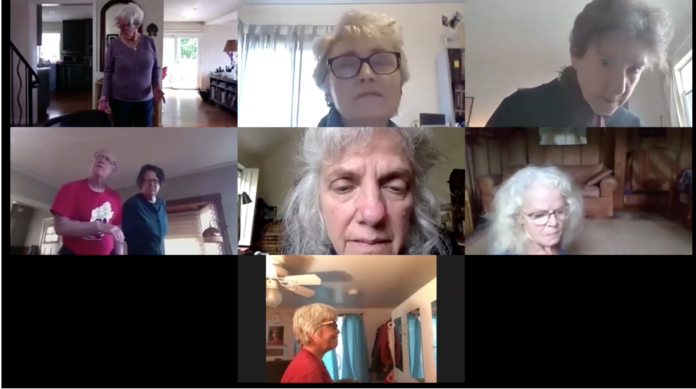Teaching Artist Bruce Bierman instructs participants during his virtual devised theatre class, offered through Stagebridge’s Perfoming Arts Institute.
Stagebridge is the nation’s oldest and most renowned theatre company for older adults. Founded in Oakland, CA in 1978 by Dr. Stuart Kendall, the organization’s mission is to enrich the lives of older adults and their communities through the performing arts.
When COVID-19 forced teachers and students at Stagebridge to shelter in place, their programming was between sessions. Staff took time to decide how to proceed with their popular Performing Arts Institute, which offers classes in acting, musical theater, tap and modern dance, devised and playback theater, storytelling, and stand-up comedy. They explored various online education models including online courses at San Francisco Community Music Center and local universities.
Finding Unique Adaptations for the Performing Arts
1. Devised and Musical Theatre
Bruce Bierman has taught devised and musical theater and dance at Stagebridge for many years. However, he was uncertain as how to how he might use this technique on Zoom.
“I wanted to just throw out the computer the first day,” said Bruce. “We go into the arts to connect with people.”
“All of a sudden we had a vocabulary to share. We practiced close-ups, medium shots, long shots,” said Bruce. “It looks so wonderful in Zoom, all these different perspectives and viewpoints. Everyone found a space in their homes and adjusted their screens so their bodies can be seen. People were moving through their homes in an improvised way, pushing through space.”
2. Dance and Movement
For his online dance class, Bruce paired up dancers in their own “rooms,” where they were assigned to create a movement piece.
One student said that even though they weren’t all in the same space, the music helped them connect with everyone else in the meeting. “That was heart-warming to hear that they could still feel that connection even though they aren’t in same physical space,” Bruce added.
“Zoom Burnout is a Real Thing”
At Stagebridge’s urging, most instructors shortened their classes for this digital format, from two hours to an hour and a half tops because as Bruce said, “Zoom burnout is a real thing.”
Every 20 minutes, participants are instructed to take a quick break, find something beautiful to look at 20 feet away and focus on that for 20 seconds.
Digital Programming is Breaking Boundaries
Stagebridge is now halfway through their online programs and have retained about 65% of their usual in-person registration. “Students felt comfortable to say, ‘This doesn’t work for me, can we figure out a better way to do this?’” said Julius. “In this way, we are having the students be the catalysts for re-framing classes in this context.”
Source:
Stagebridge Explores an Infinite Digital Landscape. Lifetime arts. (2020, August 13). Retrieved September 10, 2021, from https://www.lifetimearts.org/blog/2020/08/13/stagebridge-explores-infinite-digital-landscape/.
Comment:
This article feels very relevant because of how heavily our society had to adapt and rely on remote technologies like Zoom the past year or two due to the pandemic. It seems like with the pandemic and with people being more familiar with these technologies now, that they won’t be going away anytime soon. Stagebridge is an organization specifically geared towards older adults, so it is cool to hear their adaptations for continuing active classes and social engagement via Zoom during the COVID outbreak. There is definitely a stereotype about older adults not being tech-saavy or able to utilize things like Zoom maybe as well as younger generations. But this article shows that even if there are difficulties in using Zoom (as we all have) it turned out to be a very practical and useful tool for older adults. And may even be a consideration not just for digital mobility, but physical mobility too if people with limitations can still get social connection online without needing to go anywhere.




